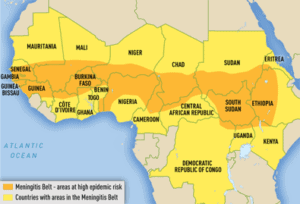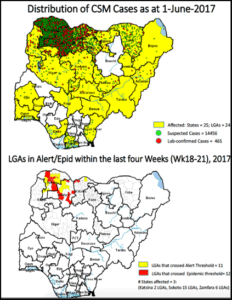Sub-Saharan Africa, aptly named the “African Meningitis Belt”, is no stranger to meningitis outbreaks with over one million cases reported since 1988. Outbreaks generally occur during the dry months (December – June) when people are more likely to spread the disease by sneezing and coughing as a result of the dry air. And this season, Nigeria has faced the largest Meningitis C outbreak in nine years. According to the latest Situation Report from Nigeria’s Centre for Disease Control, there have been 14,473 suspected cases and 1,155 deaths spanning across 25 States since December 13, 2016.

Meningococcal Disease:
Meningitis is an inflammation of the membranes surrounding the brain and spinal cord. Inflammation in this area of the body can trigger a sudden onset of fever, headache, and a stiff neck which is often mistaken for the common flu. Of the disease’s six forms, bacterial and viral are the two main causes. Viral meningitis is more prolific in the United States than the bacterial form and is generally less severe. Bacterial meningitis can be quite serious resulting in death if not treated early with antibiotics. Viral and bacterial meningitis is transmitted through close contact with an infected individual; this can include kissing, coughing, sneezing and sharing drinks (not to be confused with Mononucleosis, “mono”, known as the “kissing disease” which is caused by the Epstein-Barr virus). The bacterial form of Meningitis can also be spread through contaminated food and eating food prepared by those who have not properly washed their hands after using the toilet.
Nigeria is experiencing a Cerebrospinal Meningitis (CSM) serotype C outbreak, a bacterial form of the disease. Historically, the country has largely suffered from Meningitis A (also a bacterial form) outbreaks. In recent years, vaccination campaigns to reduce strain A have been successful but an unfortunate consequence of these mass A strain vaccination efforts resulted in the C strain becoming more dominant in the area. Since the vaccine did not cover the C strain, the disease has affected a large part of the country’s population.

Nigeria’s Mounted Response:
In mid-April, Nigerian federal health agencies and traditional leaders along with international health organizations convened to develop a national disease response strategy to address the most recent Meningitis C outbreak. The five-point plan seeks to raise national awareness, increase surveillance and disease reporting, treat existing cases, trigger a comprehensive vaccination campaign targeting priority regions, and prepare vulnerable Local Government Areas (LGAs) for future outbreaks. A month later, Doctors Without Borders (MSF) inoculated over 140,000 people in Sokoto (one of the three states that have reached epidemic levels) and vaccinated 136,000 individuals in Yobe. Treatment centers have also been established in Sokoto and Zamfara to treat those already infected.
Prevention for Travelers:
Get vaccinated! The CDC recommends getting the meningococcal conjugate (serogroups A,C,W, and Y) vaccine before traveling to the countries within the meningitis belt. Travelers should consult a doctor 4-6 weeks before traveling to ensure proper completion of doses and seek out a booster shot every five years. For international travel, the CDC does not recommend the serogroup B meningitis vaccination.
Other helpful tips:
- Reduce exposure to people that are already sick
- Wash hands – if soap is not available use hand sanitizer with a minimum of 60% alcohol
- Avoid touching your face, mouth, and eyes with unwashed hands
- Use a tissue or sleeve when coughing or sneezing, not your hands
Before traveling to Nigeria or other areas in the African Meningitis belt, contact VIGILINT for a detailed report on the latest findings of the disease and what you can do to prepare yourself for the trip.
